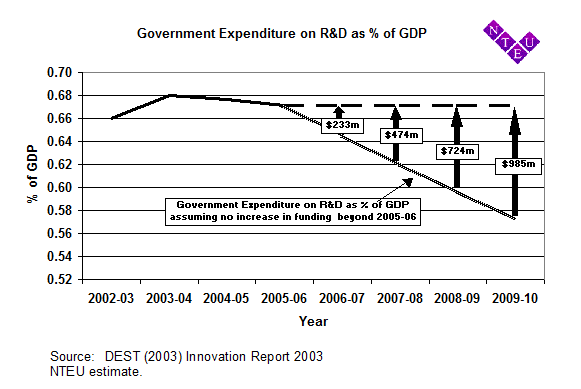|
Opinion- 26 March 2004 |
|
Hail Nelsonus, Procurator for Education, Science and Training |
Brendan
Nelson, Federal Minister for Education Science and Training, on March 24th
 addressed
the National Press Club, a bevy of scientists just honoured as Australia's
leading "Citation Laureates", students from Clonard Catholic College, the
science spokespersons for Labor and the Democrats, a vice-chancellor or two but
above all the viewing public which from Dr Nelson's demeanour he seemed to
envision as being at a minimum in the hundreds of thousands.
addressed
the National Press Club, a bevy of scientists just honoured as Australia's
leading "Citation Laureates", students from Clonard Catholic College, the
science spokespersons for Labor and the Democrats, a vice-chancellor or two but
above all the viewing public which from Dr Nelson's demeanour he seemed to
envision as being at a minimum in the hundreds of thousands.
About halfway into his address Dr Nelson, who has a love of homilies, remarked:
I was prompted over the weekend to get myself another viewing of Monty Python's Life Of Brian ...there is a scene there where the character of John Cleese is asking his acolytes, "What have the Romans ever done for us?" And of course he's inviting the crowd to say "nothing" and then of course they say oh well there was the roads, and we had aqueducts and we had health and we had law and order and we had education and Cleese then says well of course apart from all of those things what have the Romans done for us? "Well absolutely nothing". There has been the odd occasion in the last couple of years when I've said to my staff, "I feel as if I am John Cleese in the Life Of Brian" because it's not unusual for very good and effective advocates of the scientific community to say "What has the government done for science?"
Leaving aside that Cleese would have been the personification of the "advocates for the scientific community" leaving Dr Nelson to be the Roman(s) he might have thought back to one Gessius Florus who was Roman procurator for Judea from 64-66 AD, post Brian to be sure, but a Roman nonetheless, entrusted with overseeing Judea.
One description runs:
Florus behaved like an executioner and a robber rather than a governor, he despoiled whole cities. Much of his history is war propaganda but nevertheless this guy was the worst. When Gessius became procurator, injustice, oppression, and tyranny reached a climax and the people at large threw caution to the winds. Compared with him, Albinus [his immediate predessor] was liked as just and beneficent. Florus boasted openly of his misdeeds. He plundered entire cities, and many communities were totally ruined.
Seems there may have been a price to be paid for Rome's benevolence and it was certainly prolonged; most historians date Rome's rule over Judea from 6 AD to 638 AD.
One of the characteristics of Dr Nelson's style is the citing of numerous statistics in his prose. However, he is selective in the ones he proffers. It brings to mind the description of an Oxonian debater by an opponent, "he uses figures much the way an inebriate uses a lamppost, for support rather than illumination."
[We] are 0.3% of world population, who are 1% of global GDP, we are 3.7% of the GDP of the United States of America and we're still only 6% of APEC. And yet as you were able to discuss this morning we produce 2.9% of the world's scientific publications, and in fact as Nancy Bayers analysis has advised us our citation rate is 4.2%.
But shouldn't we be comparing ourselves to the OECD rather than the whole of the world and oughtn't we and our representatives in government strive to be at least in the top third of OECD nations. As given, the figures are without useful comparative value.
We will invest in terms of public investment $5.4 billion of hard earned tax-payers money in research and development in terms of public investment this year. At least in 2000 that was 0.71% of gross domestic product which compares with the OECD average of 0.68%.
Well bully for our Federal Government. That's 0.03% above the OECD mean. Or is it. According to the National Tertiary Education Union the figure should be stated as 0.68% of GDP in 2003-04 and 0.66% in 2002-03 (DESTs Innovation Report 2003 Table 5). While OECD in Figures 2003 lists the value for the Government contribution as 0.60% of GDP (2001, federal government only, page 75).
The $2.8 billion that we will invest this year in university research, which by the way is 10% above the OECD average, 19 % above that of Canada and 30% above that of the UK, half a billion dollars of that will be in humanities, arts and social sciences...
But Gordon Brown, Britain's Chancellor of the Exchequer has as one of his avowed goals to reverse Britain's brain drain. In the last spending review, in 2002, he pledged to increase funding for science from £2 (A$4.8) billion to £2.9 (A$7.0) billion in 2005. The Chancellor's just released budget is considered to be the biggest boost to education and research since the 1950s and 1960s.The 2000 round, brought an increase from £1.6(A$3.9) billion to £2.1(A$5.1) billion. Something's amiss or misleading somewhere in these statistics.
And according to the National Tertiary Education Union's President Carolyn Allport, "NTEU estimates that the Government needs to invest approximately an additional $2.4 billion in R&D expenditure between 2006-07 and the end of the decade, simply to maintain its share of expenditure as proportion of GDP at existing levels." and produces the following chart to make its case.
The NTEU does not discuss what is needed to bring the raise in support of GERD to 3% GDP by 2010, the avowed goal, for example, of the EC and Canada.
And just what is it in the milieu of our cohort nation's that encourages the private sector to pony up so much more for R&D as compared to ours?
And of the investment by our government into R&D what proportion goes for what could be considered applied research that in other nation's comes from the private sector, i.e. what proportion of public funds for R&D goes into research for the "public good" in Australia compared to our cohort?
Dr Nelson has yet to demonstrate that he wants to use the statistics he has become so fond of quoting to gain a valid understanding of how Australia is travelling relative to say the G8 nations rather than as selective support for what is in effect Australia's status quo.
Australian research is not punching above its weight; it's fighting, if you will, with its shoes laced together. And the foundations of that lamppost don't look all that solid.

Alex Reisner
The Funneled Web